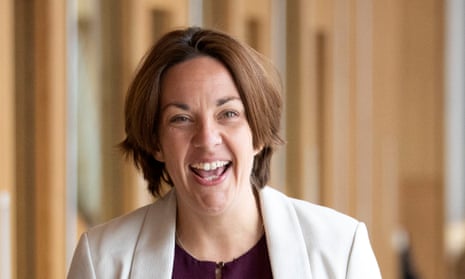Former Scottish Labour leader Kezia Dugdale says she voted SNP in 2019 Euro elections because she was ‘mad about Brexit’

Severin Carrell
Kezia Dugdale, the former Scottish Labour leader, has admitted she voted for the Scottish National party in a protest against Brexit in May 2019, in the last European elections involving the UK.
Dugdale, who was Scottish party leader from 2015 to 2017 and was still a Labour MSP at the time, has long made clear her opposition to the UK leaving the EU. She has told a BBC Radio 4 documentary, Labour’s Scottish Challenge, she was “so mad about Brexit.”
While that election was largely symbolic – the then prime minister Boris Johnson was negotiating the UK’s departure, Labour lost both of its Scottish MEPs, including the country’s longest serving MEP David Martin.
Dugdale’s switch mirrored defections by tens of thousands of Scottish Labour voters in 2019: the party recorded just 9% of the vote, its worst result amid a series of electoral humiliations at the hands of the SNP.
She said:
I voted SNP once in my life and that was in the European Union elections immediately after Brexit, where I was so mad about Brexit.
I felt I could vote for the SNP in that European Union election, because that in no way could be construed as a vote for independence.
Dugdale, who resigned as a Labour member when she quit Holyrood in July 2019 to become head of the John Smith Centre think tank at Glasgow university, insisted she had “voted Labour in every election since then”.
Even so, the defection will harden suspicions amongst her Labour critics about her pro-independence leanings. Married to the SNP’s education secretary, Jenny Gilruth, Dugdale has acknowledged she could vote yes in a future referendum.
She told the Edinburgh international book festival last year:
If you are presented with a binary choice between an independent Scotland in a progressive Europe or Little Boris Brexit Britain, I know where my cards would fall down.
I also know I couldn’t argue with the same strength for the union that I did in 2014 now. That doesn’t mean I’m ready to vote yes; there are big, big questions we need to debate as a country and resolve.

Key events

Rory Carroll
Some may believe football is more important than life or death but the Social Democratic and Labour party (SDLP) begs to differ. It has suspended an assembly member, Justin McNulty, who vanished from Stormont’s first sitting on Saturday to manage a Gaelic football team.
McNulty, who represents Armagh and Newry, slipped away early to steer County Laois to victory over County Wexford and missed his party leader, Matthew O’Toole, being nominated opposition leader.
“We weren’t informed he was going to leave nor was permission sought,” O’Toole – a former Downing Street civil servant – told the BBC on Monday. “This was a decision we had to make.” Some in the party – and people in County Louth – have backed McNulty.
Sunak says, while he ‘passionately’ backs union, UK government will ‘always respect constitutional nationalism’
In an article for the Belfast Telegraph published today, Rishi Sunak has said that, while he “passionately” believes in the union, the UK government will “respect the desire for a united Ireland” felt by nationalists.
He said:
The agreement [announced last week] safeguards the union. Far from being neutral on the Union, I passionately believe in it, consistent with the principles in the Belfast (Good Friday) agreement. Northern Ireland is stronger in the United Kingdom and the United Kingdom is far, far stronger for having Northern Ireland in it. So I was pleased that the House of Commons last week passed legislation to affirm Northern Ireland’s constitutional status as part of the UK. It was right to do so because without those new protections, we would have been unable to restore power-sharing.
Of course, I recognise there are many people in Northern Ireland who do not share these views and have different political aspirations.
The government will always give full and equal respect to constitutional nationalism and the desire for a united Ireland, pursued through peaceful and democratic means — just as we recognise that there are a growing number of people who do not define their aspirations by reference to one tradition or another.
This passage addresses concerns raised by the Irish government, and by the SDLP, a nationalist party in Northern Ireland, about language in the Safeguarding the Union command paper published last week seen as implying the UK government had weakened its commitment to allowing people in Northern Ireland a referendum on reunification if they want one.
Former Scottish Labour leader Kezia Dugdale says she voted SNP in 2019 Euro elections because she was ‘mad about Brexit’

Severin Carrell
Kezia Dugdale, the former Scottish Labour leader, has admitted she voted for the Scottish National party in a protest against Brexit in May 2019, in the last European elections involving the UK.
Dugdale, who was Scottish party leader from 2015 to 2017 and was still a Labour MSP at the time, has long made clear her opposition to the UK leaving the EU. She has told a BBC Radio 4 documentary, Labour’s Scottish Challenge, she was “so mad about Brexit.”
While that election was largely symbolic – the then prime minister Boris Johnson was negotiating the UK’s departure, Labour lost both of its Scottish MEPs, including the country’s longest serving MEP David Martin.
Dugdale’s switch mirrored defections by tens of thousands of Scottish Labour voters in 2019: the party recorded just 9% of the vote, its worst result amid a series of electoral humiliations at the hands of the SNP.
She said:
I voted SNP once in my life and that was in the European Union elections immediately after Brexit, where I was so mad about Brexit.
I felt I could vote for the SNP in that European Union election, because that in no way could be construed as a vote for independence.
Dugdale, who resigned as a Labour member when she quit Holyrood in July 2019 to become head of the John Smith Centre think tank at Glasgow university, insisted she had “voted Labour in every election since then”.
Even so, the defection will harden suspicions amongst her Labour critics about her pro-independence leanings. Married to the SNP’s education secretary, Jenny Gilruth, Dugdale has acknowledged she could vote yes in a future referendum.
She told the Edinburgh international book festival last year:
If you are presented with a binary choice between an independent Scotland in a progressive Europe or Little Boris Brexit Britain, I know where my cards would fall down.
I also know I couldn’t argue with the same strength for the union that I did in 2014 now. That doesn’t mean I’m ready to vote yes; there are big, big questions we need to debate as a country and resolve.
Photograph: Liam McBurney/PA
Rishi Sunak admits he has failed on pledge to cut NHS waiting lists
Good morning. Rishi Sunak is in Belfast today, where he is meeting political leaders, including the new first minister, Michelle O’Neill, and deputy first minister, Emma Little-Pengelly, and the taoiseach (Irish PM), Leo Varadkar. This is a (rare) good news story because, with his two revisions to the Northern Ireland protocol (the Windsor framework announced last February, and last week’s Safeguarding the Union tweaks and enhancements to the framework), and the DUP finally lifting its two-year boycott of Stormont, Northern Ireland can now move forward with devolved government in place and the Brexit disruption, if not over for good, at least receding.
But Sunak will know that prime ministers never get any credit with British voters for achievements in Belfast, and so there is an equally important story in an interview he gave to Piers Morgan on TalkTV, being broadcast tonight. Sunak admitted that he has failed on his NHS waiting lists target.
The fact that he has failed is not, of course, news. Last January as one of his five pledges, Sunak said: “NHS waiting lists will fall and people will get the care they need more quickly.” He did not say when, but waiting lists have been going up and so every assessment last month of how Sunak was doing on his pledges, like the Guardian’s, marked this down as failing.
But getting a frontline politician like Sunak to admit a failure on this scale is another matter, and Morgan did make news by forcing the PM into an awkward moment of candour. Last month, in interviews on the pledges, Sunak claimed he was “making progress”. But when Morgan asked him about waiting lists, Sunak said almost the opposite: “We haven’t made enough progress.”
The exchange went on:
Morgan: “You failed on that pledge?”
Sunak: “Yes, we have.”
Morgan: “Because you said, NHS waiting lists will fall. In fact, they are slightly coming down now. But the waiting list is still nearly half a million more than it was at the start of last year. Do you accept that?”
Sunak: “Yes. And we all know the reasons for that and what I would say to people is look we’ve invested record amounts in the NHS, more doctors, more nurses, more scanners. All these things mean that the NHS is doing more today than it ever has been. But industrial action has had an impact.”
Here is the agenda for the day.
9.30am: Rishi Sunak is due to meet Michelle O’Neill and Emma Little-Pengelly, Northern Ireland’s new first minister and deputy first minister, at Stormont. He is meeting Leo Varadkar, his Irish counterpart, too.
Morning: Sunak is expected to hold a press conference.
2.30pm: Mel Stride, the work and pensions secretary, takes questions in the Commons.
If you want to contact me, do try the “send us a message” feature. You’ll see it just below the byline – on the left of the screen, if you are reading on a laptop or a desktop. This is for people who want to message me directly. I find it very useful when people message to point out errors (even typos – no mistake is too small to correct). Often I find your questions very interesting, too. I can’t promise to reply to them all, but I will try to reply to as many as I can, either in the comments below the line; privately (if you leave an email address and that seems more appropriate); or in the main blog, if I think it is a topic of wide interest.

